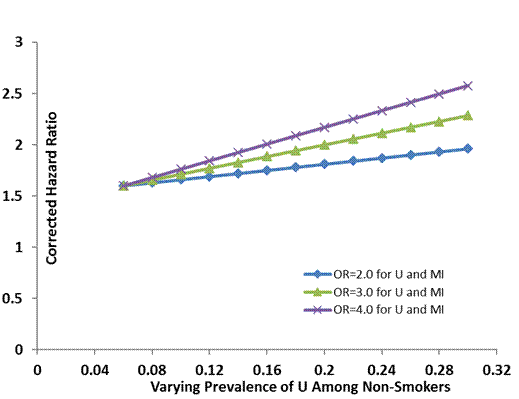Session Information
Session Type: ARHP Concurrent Abstract Session
Session Time: 4:30PM-6:00PM
Background/Purpose:
Smoking is a strong risk factor for myocardial infarction (MI), but not among
rheumatoid arthritis (RA) patients. These paradoxical findings may be due to index
event bias (a type of selection bias) which arises from selecting a group of
patients (e.g., RA) on the causal pathway (e.g., between smoking and MI); thus,
true risk factors may appear spuriously null or protective. We sought to identify
this paradox,
and employ a sensitivity analysis to handle the unmeasured or uncontrolled
factor (U) that could partly explain the paradox.
Methods: We used data
from The Health Improvement Network (THIN), an
electronic medical record database representative of the UK general population,
from 1995-2015. We analyzed data from adults (≥ 20 years) free of RA and
MI after at least 1 year of enrollment in the THIN database. Follow-up began
with first recording of smoking status after the 1-year enrollment and ended at
the time of MI, death, loss of follow-up, or the end of the study period, whichever came first. We assessed the effect of smoking
on MI using Cox regression in the general population, and restricting on
incident RA patients. We conducted a sensitivity analysis to correct for the
bias from U, by varying the prevalence of U and its association with MI. Analyses were adjusted
for baseline confounders.
Results: Of ~3.7
million subjects (mean age 46 years; 55% women; 28% current-smokers and 19%
ex-smokers), 16,061 developed incident RA of which 296 had incident MI. The
adjusted hazard ratio (HR) for current smoking and MI among RA patients was
1.56 (95%CI: 1.15, 2.12), whereas the corresponding HR in the general
population was 2.42 (95%CI: 2.37, 2.48) (Table). On the additive
scale, the adjusted rate difference was 1.1 among RA patients, and 2.2 in the
general population. For the biased HR of 1.6, the corrected HR estimate ranged
from 1.60-2.57 when the prevalence of U was set to 6% among smokers, with the
prevalence of U ranging from 20-30% in nonsmokers, and the association between
U and MI ranging from 2.0-4.0 (Figure).
Conclusion:
We
demonstrated that conditioning on RA can bias the association between smoking
and MI toward the null, and provided a method to partly correct for this paradox.
Since this bias could considerably mislead the conclusion about the
contribution of modifiable risk factors to important clinical outcomes,
investigators should consider appropriate design and analytic approaches to
avoid such
biases.
|
Table. Association between Smoking and MI in the General Population and Among RA Patients
|
|||
|
|
Non-Smokers |
Ex-smokers |
Current Smokers |
|
General Population |
N=1,999,923 |
N=725,400 |
N=1,046,288 |
|
Number of MI |
19,073 |
12,317 |
17,137 |
|
Total Follow-up Years |
12,418,719 |
4,324,379 |
6,495,178 |
|
Rate (1/1000 person-yr) |
1.54 |
2.85 |
2.64 |
|
Crude HR |
1.0 |
1.81 (1.77, 1.86) |
1.71 (1.67, 1.75) |
|
Adjusted HR* |
1.0 |
1.24 (1.21, 1.28) |
2.42 (2.37, 2.48) |
|
|
|
|
|
|
Among RA Patients |
N=7,520 |
N=3,588 |
N=4,953 |
|
Number of MI |
124 |
66 |
106 |
|
Total Follow-up Years |
34,147 |
15,683 |
23,120 |
|
Rate (1/1000 person-yr) |
3.63 |
4.21 |
4.58 |
|
Crude HR |
1.0 |
1.25 (0.91, 1.72) |
1.32 (0.99, 1.74) |
|
Adjusted HR* |
1.0 |
1.03 (0.73, 1.44) |
1.56 (1.15, 2.12) |
|
Adjusted for age, sex, baseline body mass index and alcohol intake |
|||
Figure.
Sensitivity Analysis of the Index Event Bias with a
Biased HR of 1.6
(Assuming
a 6% Prevalence of an Uncontrolled Factor (U) among Smokers)
To cite this abstract in AMA style:
Nguyen USDT, Zhang Y, Lu N, Niu J, Felson DT, Lavalley MP, Sparks JA, Chang SC, Karlson EW, Choi HK. The Smoking Paradox in the Development of Myocardial Infarction Among Rheumatoid Arthritis Patients [abstract]. Arthritis Rheumatol. 2015; 67 (suppl 10). https://acrabstracts.org/abstract/the-smoking-paradox-in-the-development-of-myocardial-infarction-among-rheumatoid-arthritis-patients/. Accessed .« Back to 2015 ACR/ARHP Annual Meeting
ACR Meeting Abstracts - https://acrabstracts.org/abstract/the-smoking-paradox-in-the-development-of-myocardial-infarction-among-rheumatoid-arthritis-patients/

